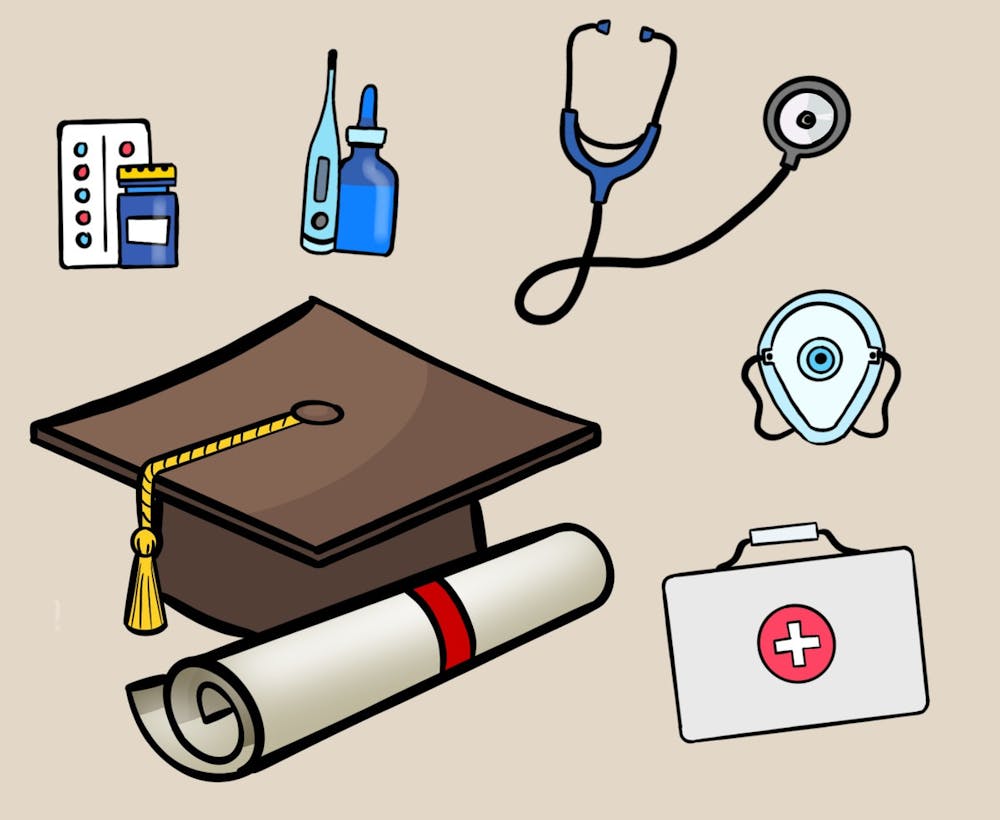The Program in Liberal Medical Education prepares University students — from first-year undergraduates to fourth-year medical school students — over eight years for a career in medicine and offers academic support throughout the process.
Admitted PLME students are guaranteed admission to the Warren Alpert Medical School following completion of their undergraduate education at Brown. Admission is highly selective: 74 out of over 4100 PLME applicants for the undergraduate class of 2027 were accepted, The Herald previously reported. Students’ experience of the program’s social elements evolves over time, according to four current undergraduate PLME students who spoke to The Herald about their lives as college students — socially and academically — both in and out of the program.
For Carlson Ogata ’25 MD’29, the program’s first and second years differed substantially. Today, Ogata said he has a “much better understanding of what I want to do” than he did in his first year.
Ogata is concentrating in Health & Human Biology and Education Studies, but he also explored other disciplines. “Last year I took courses in six different departments, and this year I’ve been spending more time in specific departments,” he said.
Maguire Anuszewski ’23 MD’27 noted that the PLME deans’ expertise and strong support system were essential to his first-year experience. “You become so well acquainted with them,” he said. First-years are also paired with PLME Meiklejohn peer advisors and have opportunities to participate in pre-clinical electives at the medical school.
Anuszewski explained that the program’s social structure progresses over time: The first year features large, structured events for students to meet while older students often interact outside of structured PLME events. “It’s always interesting to see how the dynamics (within each class) play out because sometimes they are super close, like the current freshman class seems to be, and other times more fragmented,” he added.
But despite the structure provided for PLME students, Anuszewski also noted that his college experience has not differed substantially from that of his non-PLME peers.
“Generally, PLME encourages students to have a normal undergraduate experience,” he said, “so I don’t think any of my social experiences are significantly different (from) other seniors.”
Jad Hamze ’25 MD’29 noted that the openness of the PLME curriculum allows students to pursue their undergraduate concentration with few restrictions.
The program has a set of competency requirements to be completed during a student’s undergraduate experience, with “competence in the preclinical disciplines: biology/biochemistry, chemistry, physics, statistics and the humanities and social sciences” as core academic goals, according to the program’s website. Compared to traditional pre-medical requirements, these competencies are less strict, allowing students to explore other academic disciplines, said Hamze, who concentrates in both Health and Human Biology and Middle Eastern Studies.
“We have the rest of our lives to learn about medicine and science,” Hamze said.
“The PLME deans really encourage academic exploration and don’t want you to come in with a specific degree in mind,” Ogata added.
Extracurricular activities also make PLME students’ experiences different than those of pre-medical students at other schools, according to Nate Kim ’23 MD’27. Kim noted that students in his PLME class engage in a variety of extracurricular activities, especially extracurriculars unrelated to medicine.
“People (in the PLME program) chose what they are passionate about instead of what will get them into medical school like most normal pre-meds,” he said. “That is the huge luxury of not having to apply to med schools.”
Kim, who is concentrating in Psychology and Economics, has been a member of the club lacrosse team since his first year and regularly volunteers with the Epiphany Soup Kitchen. He said that being part of these organizations has allowed him to develop meaningful friendships outside of the PLME program.
Anuszewski, a captain of the Brown ski team and technical director for Brown Aerial Acrobatics, said the program’s flexibility has enabled him to “fully involve” himself in Brown’s culture.
As they prepare to transition from undergraduate education to medical school, Kim and Anuszewski both said they feel prepared and excited to begin their medical education. “It feels like a brand new experience awaiting me — like I am a student coming into college for the first time again,” Anuszewski said.
Kim added that he “wouldn’t have changed anything about his experience” in the PLME program, noting that it connected him to doctors and physicians in Rhode Island.
While they have two more years until they begin their time at Alpert, Hamze and Ogata said they are working to balance present and future ambitions. “I am excited about the freedom this program allows me to explore different … academic disciplines,” Ogata said.





